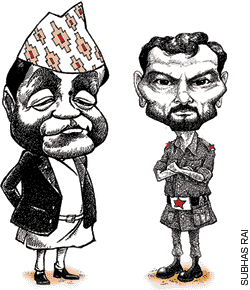 For this peace process to start, there should be a moratorium on self-serving politicians, ex-politicians, would-be politicians and activists opening their mouths. We're all for freedom of expression, but nothing these stalwarts of democracy are saying is pragmatic or constructive. It reeks of the same cynicism, negativism and intrigue that brought the country to this sorry state. Will we ever learn?
For this peace process to start, there should be a moratorium on self-serving politicians, ex-politicians, would-be politicians and activists opening their mouths. We're all for freedom of expression, but nothing these stalwarts of democracy are saying is pragmatic or constructive. It reeks of the same cynicism, negativism and intrigue that brought the country to this sorry state. Will we ever learn? If this is the way it's always going to be, then we despair for this country. It's hard not to be deterministic about it, because more than any other human sub-species, Nepali politicians seem to be genetically hardwired for disunity. Disagreement in democracy's marketplace of ideas is a healthy thing, and agreeing to disagree is the way we move forward. But here, our disagreements paralyse us, because they become so personal and are fed by base instincts like jealousy, greed and a dog-eat-dog competition for power and wealth.
Even after a truce is announced, this is what we see before us: political parties not able to agree among themselves about how to agree with the king about an agreement with the Maoists. There are interlocking layers of disagreements-within parties, between parties, between the parties and the king, between the parties and the Maoists, between the king and the Maoists, and among the Maoists themselves.
What's more, there are even members of the cabinet who can't seem to be able to countenance the idea of a colleague from a minority community being in the limelight for putting the country back on track to peace. Politicians everywhere are known for their short-term tunnel vision, but only our politicians will destroy each other over who is going to get the glory for restoring peace. Even a fissiparous protozoa has better instinct about the common good.
The Nepali peoples' tragedy is that we never got the leaders we deserved. From a limited line-up of mediocre talent, we chose the ones that had the likeliest potential to exhibit vision, statesmanship and altruism. We hoped they would rise above selfish or partisan interest, but no such luck. It's about time these failed characters stopped trying to wreck things just because someone else is trying to fix a problem they contributed to creating.
So, instead of moaning, hemming and hawing, how about helping out in the process of peace-building? There is much that can start immediately to restore the peoples' confidence with a Marshall Plan-type nationwide reconstruction and reconciliation campaign. Money will not be a problem, donors are still standing by for a government that works.
But peace won't just fall on our laps, it has to be painstakingly rebuilt. The Maoists are worried about their militia and cadre. Who is going to feed them in the run-up to talks? Some dacoits who became Maobadis in the Rautahat area have gone back to their dacoit ways. This could happen elsewhere if a system is not in place urgently for their assimilation.
All this is not going to be easy, and it needs everyone pulling together in the same direction. A ceasefire with the Maoists was perhaps the easy part. Maybe what we actually first need is a ceasefire between the palace and the parties.


